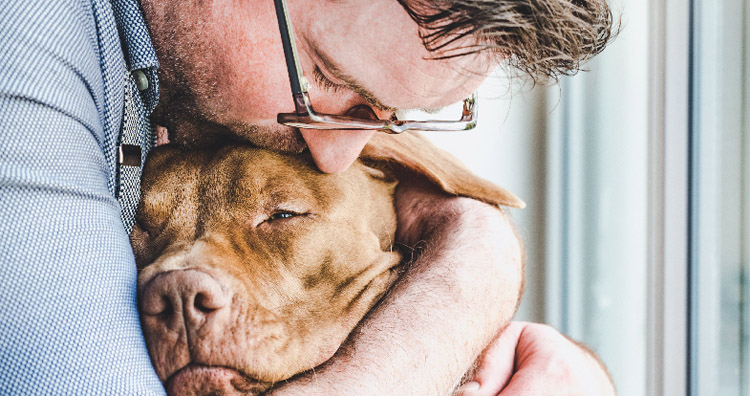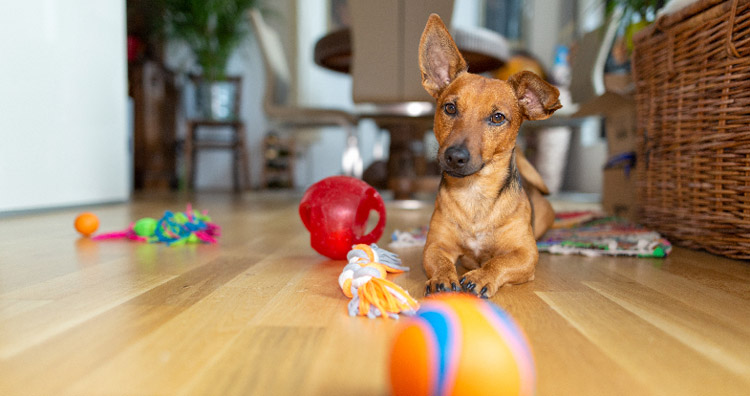How to prevent anxiety due to separation
September is the month for going back to school, back to work and the normal routines. For dogs it is their time for being left alone at home and some of them are unable to manage the stress caused by the feeling of being abandoned. As a result, they suffer anxiety on being separated from the person to whom they feel attached. We give you some ideas on how to prevent it. .
The origin of anxiety due to separation is not at all clear. It is well known that some dogs are predisposed to anxiety. In some cases, it could be that they have had unsuitable or insufficient experience in socialising during their juvenile days. In others, these are dogs with very noticeably dependent behaviour, following their master without ceasing and becoming nervous when he is out of sight, even at home. Adopted dogs that have been through several changes in their circumstances often suffer an emotional imbalance which leads them to be excessively attached to their owners. As a result, they fall into a serious state of anxiety in the absence of their humans.
Symptoms of anxiety due to separation
Every dog shows his anxiety differently but, in any case, the vets at the Real Sociedad Canina de España (RSCE) advise acting as quickly as possible, before there is a more serious alteration in behaviour. These are the main signs to watch for, indicating that your dog suffers anxiety due to separation:
- He forgets how and when to do his business. In this case you have to be very patient and teach your dog all over again how to behave.
- He shows an excess of energy. We can understand this attitude if we bear in mind that during the holidays we did a lot of things with the dog that have now come to an end. To soften the contrast it is a good idea not to shorten the walks, as this is something that we tend to do from September on, both for lack of time and because the days are becoming shorter.
- He is sad. Have you noticed that your dog is apathetic, less participative and wants to be with you all the time? If he doesn’t want to go for walks, then for sure his mental attitude is really low. Also, you might notice that he has less appetite than usual and that he isn’t sleeping well. Don’t be mingy with cuddles. Caresses and talking to him quietly can help him to feel secure.

- He is becoming a nuisance. When left alone at home he doesn’t just bark, he also howls. His barking is rhythmic and persistent.
- His behaviour is destructive. When you come home from work you discover that he has destroyed the door frames or the legs of wooden chairs in the kitchen or has broken some delicate object that you were very fond of.
- He tries to escape from his allotted place. If, precisely to avoid that kind of behaviour, you have reduced his living area, he might try from time to time to get out of that confinement and move freely all around the house.
- He is obsessive, that is, with fixed patterns of movement like going round in circles or in straight lines but repetitively. There are people who decide to install a camera to see how their friend is behaving when he is alone at home and to see whether he is really suffering anxiety or needs to be better trained.
- He is too demonstrative before you leave and greets you even more excessively when you come home.
- He dribbles and seems worried when you are getting ready to go out (guessing that you are going without him).
Guidelines to preventing anxiety due to separation
The anxiety caused by your absence starts, in general, at the moment when your dog sees that you are about to go away and leave him all alone at home. To prevent it, we give you some advice on what to do and what not to do before you go.
Create a healthily affectionate relationship, that is, avoid his excessive clinging to and dependence on his human. How can we do it? First, by totally ignoring it when he insists on asking for attention. It may sound radical, but it’s effective. Stop looking at him, talking to him or caressing him if he makes himself tiresome and, on the other hand, treat him with love and calmness only when he is quiet.
Ignore him before you go out and when you’ve just come in. This includes going without any form of parting, avoiding saying ‘goodbye’ or making it obvious that you are going out. Don’t pay attention to him for 30 minutes before you go out of the door. When you come back, look at him and caress him only when he stops jumping about and calling for your attention.
Play at being absent-minded. Try changing your routines before going out. Most of us have a regular pattern of movements before we go, such as, for example, drinking water, putting on a coat, shoes, collecting the keys, etc. Try not to do exactly the same thing every day in the same order before you go out, so that your dog can’t tell exactly when you are going.
Try false departures from home to confuse him. This is just the opposite of the above idea. Try to go through the ritual of leaving at different times of day, but without actually going. Bit by bit he will learn not to get all wound up when, although it looks as though you are going, in the end you don’t go.

Walks and running. Go for a long walk and play games that make your dog use a lot of energy so that he relaxes and gets tired and sleepy (but not immediately before you go out because then he would be left in a highly active state).
Leave his favourite toys. To help him to be distracted and entertained, let him have his favourite entertainments, such as an interactive toy full of food, for example. Remember to do it without talking to him or looking at him and repeat the action at other times and in other contexts so that it is not connected with separation.
Restrict the area. Particularly when dealing with a puppy, reduce his living area to just one room until he is accustomed to it.
NEVER use punishment. If when you come home you discover that your four-footed friend’s behaviour has been truly awful, don’t punish him. Remember that a punishment given at the wrong time doesn’t work because it isn’t understood, it just causes insecurity and, therefore, more anxiety.
Your dog’s bad behaviour caused by anxiety due to separation can be corrected with patience and consistency. If you need it, you can always get advice from a vet specialised in animal behaviour who will help you to establish and follow the right guidelines for each case.
RSCE
link a la web: https://rsce.es/es/